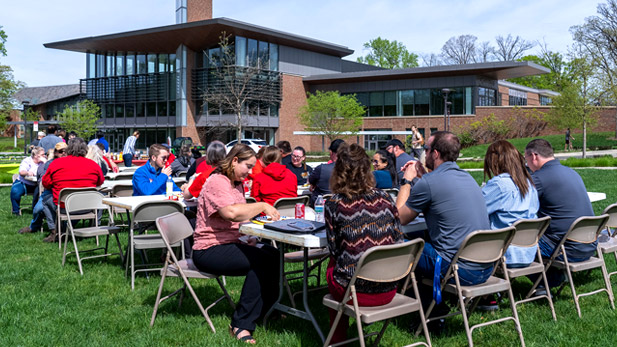Innovative Six Sigma Program Empowering STEM Careers

Six Sigma program students applied elements of team communications, statistical methods, and Lean engineering practices taught by Professor Diane Evans, PhD, to organize campus events during the 2023-24 school year.
Cutting-edge Six Sigma expertise is blending with a rigorous STEM education to provide students with a valuable toolkit to become go-to problem solvers within any organization.
The program within the Department of Engineering Management develops skills that help students apply statistical methods to drive decision-making. They also streamline processes and improve business performance, tackle environmental and sustainability challenges, and lead teams and manage complex projects.
Along the way, students are earning a minor in Six Sigma and 16 students have completed green belt certification the past two years from the Institute of Industrial and Systems Engineering. This makes them indispensable to employers across several industries.
"The Six Sigma process is being used by companies to address environmental and sustainability concerns along with statistical methodology for process improvement and quality enhancement. Our students are at the forefront of implementing these innovations," explained Engineering Management Professor and Six Sigma advisor Diane Evans, PhD.
Coursework teaches students about important elements of team communication, statistical methods, and current Lean engineering and technology techniques, principles, and philosophies relevant to manufacturing and service sectors. As a Six Sigma green belt, students are equipped to support and champion Six Sigma implementation in their organizations.
Along the way students apply elements of statistical analysis and data collection to lead initiatives addressing environmental and sustainability concerns, such as recycling and food waste/share programs, and have driven change that improved operations for campus and community organizations.
Students also have incorporated Six Sigma principles into their other academic activities, research and design projects, and internship assignments.
“Six Sigma gives you a bird’s-eye view of project development and how everything fits together. It makes you more efficient and effective, and a better member of a team,” said Vincent Hammer, a senior optical engineering student.
Engineering physics senior Nick Jones has discovered that Six Sigma data collection techniques enhanced his work to develop a camera system that examines plant health, along with other academic projects.
“You can’t improve a process without knowing what’s wrong, and data is a key to unlocking those mysteries,” he stated. “I now have a better idea of how to collect data, recognize what those numbers means, and what to do with the information.”
The Rose Squared program, allowing students to take graduate-level coursework while pursuing their undergraduate engineering education, has expanded opportunities for students from nearly every academic program to be able to benefit from the Six Sigma program, according to Evans. (Hammer and Jones are Rose Squared participants, with plans to add master’s degrees in engineering management to their bachelor’s diplomas.)
“We’re seeing more students taking advantage of these educational opportunities. It’s adding to their already impressive resumes,” she said.
Another program asset has been the support provided by David Hoecker, a 1969 mechanical engineering alum who worked in quality control with The Timken Company. His donations have supported students' work on several Six Sigma projects.